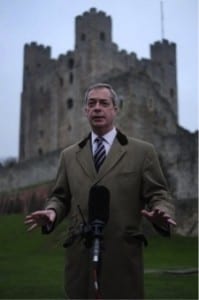 Not for the first time in the history of England has Rochester Castle been at the centre of a political rebellion. Eight-hundred years ago, Rochester Castle was taken by the rebels in the ‘First Barons’ war following widespread disillusionment with an unpopular King.
Not for the first time in the history of England has Rochester Castle been at the centre of a political rebellion. Eight-hundred years ago, Rochester Castle was taken by the rebels in the ‘First Barons’ war following widespread disillusionment with an unpopular King.
For King John, Rochester was critical, for it was positioned on the Medway, en route to London and his court at Westminster. Take Rochester, and it was said that London would fall and the rebels would win. As we venture towards the anniversary of Magna Carta, will the United Kingdom Independence Party leader Nigel Farage be hoping for history to repeat itself?
This November, Rochester was the scene of yet another political upset for the establishment, as former Conservative MP Mark Reckless switched his banner from Conservative blue to Ukip purple and sneaked to victory in the ensuing by-election.
But just how important was this victory for UKIP? Well, they didn’t win to the extent which some commentators thought that they would, with local anger spilling over at Mark Reckless’ defection. Albeit, Ukip still won the seat polling 44% of the vote with the Conservatives trailing in their wake with 32%.
In reality, it is a slender margin to defend in the context of an imminent general election in May next year, and voters always relish the opportunity to given the incumbent political party (especially when it’s the governing party) a good kicking when it comes to a by-election. In this case, the situation was compounded by the fact a relatively popular sitting MP swapped sides, so took many of his personal supporters along with him.
Perhaps, this analysis is too simple. The Rochester result signalled the second Ukip MP to be elected to parliament in as many months – and another Conservative defection. Twelve months ago the prospect of Ukip having any MPs in parliament would have been fantasy, but it’s now reality, and the fear for the Conservatives (who have most to lose by leeching votes to Ukip) is that the British people are developing a taste for voting for Nigel Farage’s party, at exactly the time when they should be coming back into the Conservative fold.
But Ukip isn’t exclusively a Conservative problem. As we enter into the Christmas period, none of the three main party leaders will be feeling particularly festive. The Labour leader Ed Miliband is struggling to cement his leadership credentials to the country as well as his party (and Nigel Farage has repeatedly outlined that he believes he can plunder voters away from Labour with equal success as he’s had with the Conservatives).
The Deputy Prime Minister and leader of the Liberal Democrats Nick Clegg will head into the general election with his party on the verge of decimation if we believe the opinion polls, so disenchanted are voters with his party’s record in government and their limited impact on curtailing the policy agenda of the Conservative dominated coalition.
Ironically, it is the rumoured general election television debates which could eventually provide the tonic that Messieurs Cameron, Miliband and Clegg all crave. The opportunity to see the Ukip leader Nigel Farage, explain some of his more colourful policies alongside their own.
While some sections of the electorate have undoubtedly taken to the Ukip message of a Britain able to function perfectly well outside Europe, for the majority this still seems a risky option and one which carries to many unanswered questions. The problem is none of the three main party leaders have yet to come up with a compelling counter argument.
Only time will tell, if Rochester was just another blip on the election trail, or perhaps, it could just be the continuation of something larger, a significant shift in the British political landscape. I don’t think it’s quite time to toast to King Nigel in the streets of Rochester, but it’s not outlandishly impossible that he could have a lot to celebrate come May.


